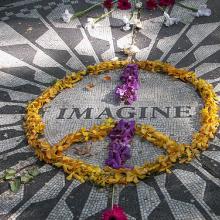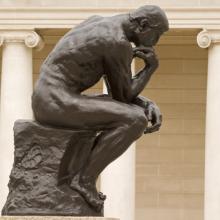Religion
The reprimand that came out of the Vatican last month has familiar echoes.
The statement addressing the Leadership Conference of Women Religious (LCWR), which represents 80 percent of nuns in the United States, accuses the organization of “serious doctrinal problems” regarding the focus of religious practice, among them, a concern that the Catholic Sisters are too focused on social justice and not enough on voicing the Church’s views on homosexuality or abortion.
For me, the reprimand carries reverberations of similar friction from my undergrad that followed a weeklong retreat on Chicago’s West Side.
Amy is incredibly intuitive, and she enjoys a faith that I find sort of mysterious. This extends beyond God to faith in other people too: another quality I tend to lack. When I met her, she was already serving in ministry, while I hadn’t darkened the door of a church in a decade. I got in trouble in church in the first place for doubting and questioning, which seemed to rub up against the more intuitive faith of those in my church at the time.
The message I got was that critical thought and faith simply didn’t mix. But in the more “progressive” mainline churches, I found a space in which such challenging questions were welcome. Small wonder, I guess, that some folks view such denominations and churches as fomenting atheism beneath the cloak of Christianity.
This is a response to some of the NPR coverage on pastors who are losing their religion. It's a heartbreaking series. I say that not because people are losing their faith, changing their minds about religion. I'm heartbroken because I'm not hearing about any Christian tradition other than American Fundamentalism. That's Christianity according to mass media and, apparently, according to the men and women who have stepped away from the Church. They believe so strongly in the arguments of Fundamentalism that they cannot imagine another form of Christianity. They cannot imagine another God. They believe that Fundamentalism is the only theology out there. They believe in One God, the Fundamentalist God. So, in breaking with that rhetoric, they have to break with the whole Church.
We who believe something other than American Fundamentalism have failed these people. We have failed again and again to successfully offer the alternatives to Fundamentalism. Instead, we sit in our beautiful neo-gothic buildings or in our hip-coffee shops or under the dome of the Pantokrator and wonder why people do not know us. It's simply crap. If all there were in Christianity was American Fundamentalism, I would be an atheist, too. Perhaps the Fundamentalists have won after all.
I talk to folks a lot about what role the church should have in contemporary life in serving people. There’s the trend of “third space” ministry, getting out of the four walls of the church building and meeting people in different, typically “secular” contexts.
One defining trait of postmodern life is the blurring of previous boundaries. Just like work now can go with us beyond the cubicle, people think about faith in different terms than just sitting in a sanctuary on Sunday morning. There are entire ministries that do all of their work online, broadcasting services, or recording them for people to view on demand. There are blogs (like mine) whose authors consider what they do to be a ministry, though not in the typical sense of the word.
One in four young millennials (age 18-24) identify themselves as religiously unaffiliated—up from 11 percent in their childhood. But the distinguishing factor for this age group is that the “unaffiliated” label may stick with them into adulthood and beyond.
“This cohort is so dramatically different—racially, ethnically and religiously—it can’t help but change the character of our country,” Daniel Cox, director of research at Public Religion Research Institute, said at the presentation of the “Millennial Values Survey,” conducted by PRRI and Georgetown University’s Berkley Center for Religion, Peace and World Affairs.
In the past, young adults have tended to lapse in faith during their college years and twenties, only to return with age and family. Robert Jones, PRRI founder and CEO, said that’s not likely to happen as much with this age group.
“We’ve got to come up with some new measures of religion,” Jones said.
Belief in God is slowly declining in most countries around the world, according to a new poll, but the truest of the true believers can still be found in developing countries and Catholic societies.
The “Beliefs about God Across Time and Countries” report, released Wednesday (April 18) by researchers at the University of Chicago, found the Philippines to be the country with the highest belief, where 94 percent of Filipinos said they were strong believers who had always believed.
At the opposite end, at just 13 percent, was the former East Germany.
Andrew Bowen sat yoga-style in his armchair, absent-mindedly fingering a set of Muslim prayer beads in his left hand as he talked about 2011 -- his year of conversion.
But he's not Muslim. In fact, the 29-year-old Lumberton resident doesn't call himself by any of the 12 faiths he practiced for a month at a time last year.
Not Hindu (January). Not Baha'i (February). Not Zoroastrian (March). Not Jewish (April). Not Buddhist (May). Not agnostic (June). Not Mormon (July). Not Muslim (August). Not Sikh (September). Not Wiccan (October). Not Jain (November). And not Catholic (December).
Finding faith in God again was not Bowen's aim. This young father of two was looking for faith in humanity.

Alain de Botton. Image via www.alaindebotton.com.
This is not another book that simply critiques religion. In Religion For Atheists: A Non-believer's Guide to the Uses of Religion, Alain de Botton, a noted author on a wide range of themes – from architecture to the works of Proust – examines those engaging and helpful aspects of religion (particularly focusing on Christianity, Judaism and Buddhism) that might, as he puts it, “fruitfully be applied to the problems of secular society.”
Anyone who might be offended by a work that from the outset (indeed on its very first page) asserts that “of course no religions are true in any God-given sense”, is encouraged to steer clear of this book by the author himself.
It is a book that seems to swing between revulsion of religion and the “religious colonization” that atheists are charged to reverse and a recognition that all is not well in the secular world, and that these ills may be somewhat righted by looking toward religion – let me clarify – toward those aspects of religious traditions that de Botton believes are relevant to the world today: community, kindness, education and art, for example.
The very first subject to be tackled is that of community – something that Sojourners knows a little something about (check out Nicole Higgins’ recent review of Wanderlust for some insights) – and what strikes me as interesting is that de Botton’s hypothesis on the loss of community mirrors a phrase often spoken by Sojourners CEO Jim Wallis:
Did we lose our sense of community when we began to privatize our faith?

Sunrise over New York City. Image via Wiki Commons (http://bit.ly/HRlswn).
I know that the sun will rise tomorrow.
With all of the scientific facts and astronomical data we are blessed with today, I can expect to wake up tomorrow and see rays of light shining through my window.
There is also no debating time. Our clocks, both digital and internal, continue to tick onward no matter the circumstances. These are inexorable certainties in life. However, these proven facts of our existence are limited. They are not the whole story.
There are things in life we neither can physically see nor explain, and yet we choose to believe anyway.
When our little siblings place their fallen teeth underneath their pillows, hoping to see a winged fairy deliver gifts in return, they are relying entirely on an unproven belief. When students choose universities to attend, they do not know what the outcomes of their decisions will be, nor can they predetermine their futures after school. But they continue to grow and experiment with life anyway.
Even the wisest of theologians and clergy have very few answers to the questions pertaining to God’s existence that enter our minds on a daily basis. All of these situations represent something many of us hold onto so dearly: Faith.
“When religion ruled the world, they called it the Dark Ages.”
That was the bumper sticker quote I read on the tailgate of a white minivan during my morning’s commute to work. Upon reading, I had so many adverse gut-reactions to this statement.
That’s so closed minded. And, Aside from a few erroneous events, don’t you know how much good Christianity has done for the world? And, I am sure you have all the answers to all the world’s problems then don’t you, Mr. White Minivan? (Amusingly, the sticker on the opposite side of the tailgate read “I think, therefore I don’t listen to Rush Limbaugh,” to which I thought, Meh, fair enough.)
Once I worked through my initial feelings of angst though, I reflected on those words a bit more. I realized maybe he has a point. When religion rules, things generally do not go well for the people practicing it, or for those who are being subjected to the religious standards.
NEW YORK — Did leaders of the Southern Baptist Convention hurt their missionary cause by opting not to change the denomination's name to something a bit more, well, marketable?
Maybe, but as the advertising executives of Madison Avenue here could attest, as tempting as it is to try to solve a missionary slump with a marketing campaign, religious groups — like commercial businesses — should think twice before undergoing a brand overhaul.
After months of deliberations, an SBC task force on Feb. 20 recommended against trying to re-brand the denomination, an idea that has been bandied about for more than a century.
Proponents of a change made a good case: for a denomination that was born in 1845 out of a defense of slavery, the name has since saddled Southern Baptists with a problematic name and historical baggage.
WILMINGTON, N.C. — As the only Southern state without a constitutional amendment barring same-sex marriage, North Carolina is the next battleground, with religious groups on both sides bracing for a high-stakes fight on May 8.
Against a recent string of gay-marriage victories in California, Washington state and Maryland, North Carolinians will be asked to vote on a constitutional amendment on May 8, the same day as the state Republican primary.
Same-sex marriage has been illegal in the Tar Heel State since 1996; Minnesota also has a marriage amendment planned for a vote in November.
"Marriage between one man and one woman is the only domestic legal union that shall be valid or recognized in this state," the proposed amendment reads.
Editor’s Note: At 3:30 p.m. on Saturday, March 27, 2004, when I was the religion reporter for the Chicago Sun-Times, I met then-State Sen. Barack Obama at Café Baci, a small coffee shop at 330 S. Michigan Avenue in Chicago, for an interview about his faith. Our conversation took place a few days after he’d clinched the Democratic nomination for the U.S. Senate seat that he eventually won, and four months before he’d be formally introduced to the rest of the nation during his famous keynote speech at the 2004 Democratic National Conventio.
We spoke for more than an hour. He came alone. He answered everything I asked without notes or hesitation. The profile of Obama that grew from the interview at Cafe Baci became the first in a series in the Sun-Times called “The God Factor,” which would eventually became my first book, The God Factor: Inside the Spiritual Lives of Public People, in which Obama and 31 other high-profile “culture shapers” — including Bono of U2, Nobel Laureate Elie Wiesel, the author Anne Rice and President George W. Bush's speechwriter Michael Gerson — are profiled.
Because of the seemingly evergreen interest in President Obama’s faith and spiritual predilections, and because that 2004 interview remains the longest and most in-depth he’s granted publicly about his faith, I thought it might be helpful to share the transcript of our conversation — uncut and in its entirety — here on God’s Politics.
~ Cathleen Falsani
Imagine a Catholic Church that stopped catering to its tiny cadre of old male bishops and heard instead the cries of its people. Or a fundamentalist movement that stopped defending its franchise by nonsensical attacks on evolution and modernity, and instead took Scripture seriously.
Imagine a conservative Christian movement that dropped its relentless assault on women's rights and instead sought a fresh vision of family and values. Or a progressive movement that listened to people, rather than lecturing them.
Too many "providers" — in politics, business and religion — come across as having a low opinion of their constituents. People tend to be good judges of what matters to them. Voters know this recession better than their would-be leaders seem to know it. Believers seem to take their faith more seriously than those institutions that seek to enroll them as members.
"I have found great beauty in religion and religion has shown me great beauty in myself and in the world," Tripp says, as he reflects on the 11 years since he's had a drink. "I'm still not sure I know what being beloved means. Somehow we forget that we are beloved....Today is the 11th anniversary of the day I was told who I was. It's a good day."
The GOP presidential race gets "rickrolled." Obama's "Komen moment"? Vatican holds unprecendented service of repentance for clergy sex abuse, while in the U.S. a bishop reitres and promptly recants his previous apology. Dickens remembered as a Christian believer and in South Carolina "I Believe" license plates go on sale. In Iran, thousands of women are trained as "ninjas" and we give you archival video of "Nunjas." That and more inside the blog...
Why I Hate Religion, But Love Jesus is a true Internet phenomenon, garnering more than 18 million views and sparking a global debate.
As with most internet phenomena, the viral video has given birth to dozens of similar videos from folks around the world, each adding a different (sometimes serious, sometimes not) perspective to the debates.
Whilst none has had quite the same impact as the original in terms of millions of hits, clicks and media coverage, there are conversation starters aplenty in many of these intriguing (and entertaining) videos.
See a roundup of some of the most interesting responses inside the blog...

Atheist bumper stickers via Wiki Commons http://bit.ly/xFqYIO
When I talk about myself in relationship to atheists I often sound like a post-civil-rights white person trying to minimize the gap between myself and another group.
I don’t have anything personally against atheists.
Some of my best friends are atheists.
I even like Ricky Gervais. He’s an atheist, you know.
All of this aside, I have tried in vain over the years to understand atheism. I’ve written about it several times, and whenever I do, I get a bucket of responses from atheists.
Are you a Christian who spends a lot of time online? Then perhaps you've heard of Jeff Bethke. Bethke, aka bball1989, is a spoken word poet whose rhymes and videos are capturing the attention of thousands of Christians across the web.
His latest video is going viral among online Christian communities. Provocatively titled “Why I Hate Religion, But Love Jesus,” the poem is a unique fusion of prophetic criticism, personal testimony, and a call to action.

The Strawberry Fields "Imagine" memorial in NYC's Central Park. Image via Wylio http://www.wylio.com/credits/Flickr/2512334908
Cee Lo Green got himself in some pop-culture hot water on New Years Eve when he changed the lyrics to John Lennon's "Imagine." You would think he was changing the Bible or something, but no, it was much worse. He changed the lyrics to a John Lennon song. "No religions" became "all religions" and all hell broke loose....
Suffice it to say that people were put out. They defended Lennon's unchangeable artistic canon. Green's supporters suggested that all art can be reinterpreted...even John Lennon's. Personally, I didn't find it offensive at all. Instead, I thought it was a thoughtful (if momentary) update to the iconic pop song. Given the religious strife in the world, expressing a love for humanity through all the world's religion was generous and very appropriate for a New Year celebration.
Alas, no. We're beset by fundamentalisms of all kinds (Lennonists?) and on all sides in this nation of ours. We're sufficiently afraid of religiosity that we've turned anti-religiosity into a religion and musicians become gods and their three minute songs become scripture...unchangeable holy writ.
We're afraid and that fear strips us of our compassion.















